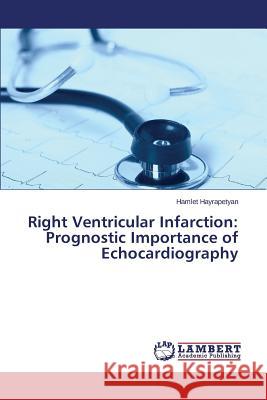Right Ventricular Infarction: Prognostic Importance of Echocardiography » książka
Right Ventricular Infarction: Prognostic Importance of Echocardiography
ISBN-13: 9783659544811 / Angielski / Miękka / 2014 / 80 str.
Right Ventricular Infarction: Prognostic Importance of Echocardiography
ISBN-13: 9783659544811 / Angielski / Miękka / 2014 / 80 str.
(netto: 93,51 VAT: 5%)
Najniższa cena z 30 dni: 98,19
ok. 10-14 dni roboczych
Bez gwarancji dostawy przed świętami
Darmowa dostawa!
This book discloses main anatomico-physiological characteristics of the RV, explains pathophysiological changes related to involvement of this chamber in acute inferior STEMIs and reviews current treatment approaches. The right ventricle (RV) has long been neglected, yet its function has been recently shown to be a major determinant of clinical outcome and consequently should be considered during clinical management and treatment. Thus, the need for early diagnosis and proper treatment of RV infarction which complicates up to 50% of inferior STEMIs is evident. In practice, clinicians largely rely on non-invasive imaging methods for assessment of RV function. Two dimensional EchoCG is the mainstay for analysis of RV function as it can help clinicians to measure extend of RV dysfunction associated with RV infarction. Our recent prospective study has supported the point that EchoCG parameters have unique role in predicting in-hospital and long-term cardiac events in acute inferior STEMI patients. Moreover, we successfully tested two new EchoCG measurements and showed their powerful prognostic role.
This book discloses main anatomico-physiological characteristics of the RV, explains pathophysiological changes related to involvement of this chamber in acute inferior STEMIs and reviews current treatment approaches. The right ventricle (RV) has long been neglected, yet its function has been recently shown to be a major determinant of clinical outcome and consequently should be considered during clinical management and treatment. Thus, the need for early diagnosis and proper treatment of RV infarction which complicates up to 50% of inferior STEMIs is evident. In practice, clinicians largely rely on non-invasive imaging methods for assessment of RV function. Two dimensional EchoCG is the mainstay for analysis of RV function as it can help clinicians to measure extend of RV dysfunction associated with RV infarction. Our recent prospective study has supported the point that EchoCG parameters have unique role in predicting in-hospital and long-term cardiac events in acute inferior STEMI patients. Moreover, we successfully tested two new EchoCG measurements and showed their powerful prognostic role.











